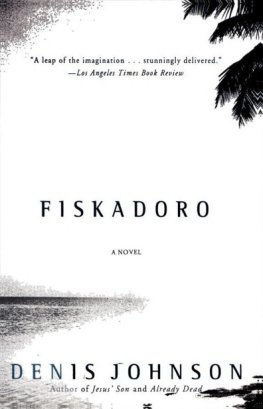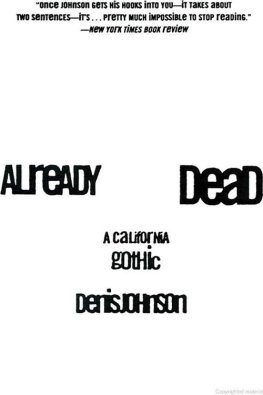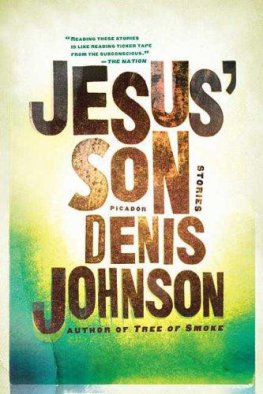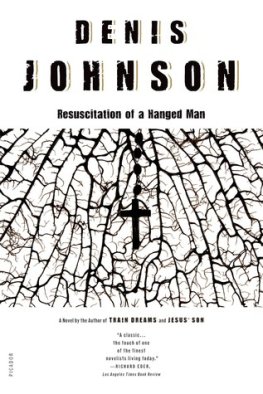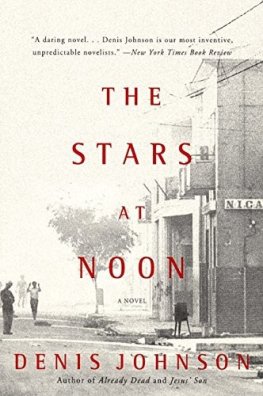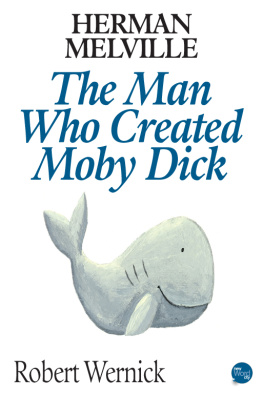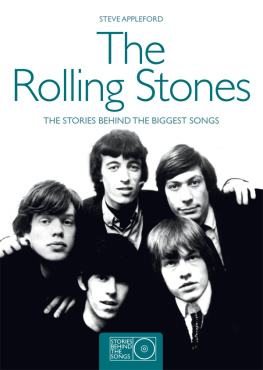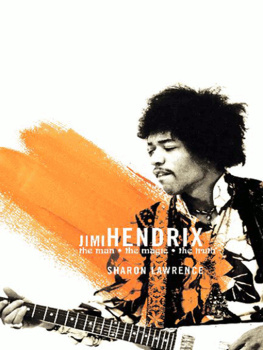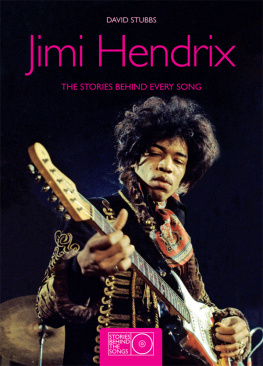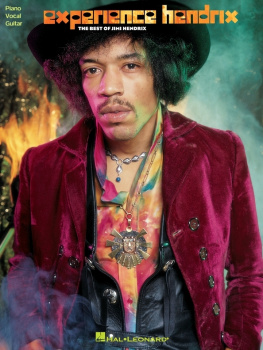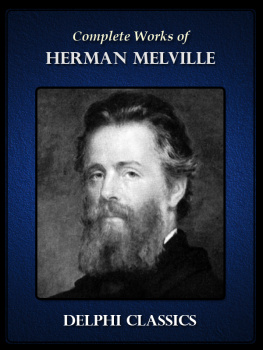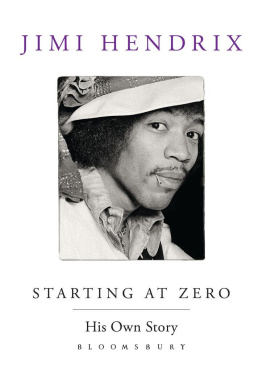pescador, ra, n. fisherman (-woman),
fisgador, ra, n. harpooner.
Appletons New Cuyas Dictionary
A good deal of the inspiration for this story came from the works of Ernest Becker, Bruno Bettelheim, Joseph Campbell, Marcel Griaule, Alfred Metraux, Oliver Sacks, and Victor W. Turner. With the caution that this book doesnt offer to represent their thinking, I want to acknowledge my debt to these students and teachers of humankind.
The quotes on pages 456 come from All About Dinosaurs by Roy Chapman Andrews (Random House, 1953). Those on pages 1523 come from Nagasaki: The Forgotten Bomb by Frank W. Chinnock (The World Publishing Company, A New American Library Book, 1969). Phrases from the Koran are quoted from the Penguin Classics edition of the N. J. Dawood translation.
It is a pleasure to thank the National Endowment for the Arts and the Massachusetts Arts Council for grants that made this writing possible; and Bill and Nancy Webb for a gift of space and privacy.
HERE, AND ALSO SOUTH OF US, THE BEACHES HAVE A YELLOW TINT, but along the Keys of Florida the sand is like shattered ivory. In the shallows the white of it turns the water such an ideal sea-blue that looking at it you think you must be dead, and the rice paddies, in some seasons, are profoundly emerald. The people who inhabit these colors, thanked be the compassion and mercy of Allah, have nothing much to trouble them. Its true that starting a little ways north of them the bodies still just go on and on, and the Lord, as foretold, has crushed the mountains; but its hard to imagine that such things ever went on in the same universe that holds up the Keys of Florida. It strains all belief to think that these are the places the god Quetzalcoatl, the god Bob Marley, the god Jesus, promised to come back to and build their kingdoms. On island after island, except for the fields of cane popping in the wind, everything seems to be asleep.
In our day sugar is a major crop of the Keys. In Fiskadoros time, during the Quarantine, whole islands were given over to the cultivation of rice, while sugar cane was a product only of patient neighborhood gardeners like Mr. Cheung.
On the day they met, Mr. Cheung happened to be tending his garden. The gritty earth stung his bare knees where he knelt in his underwear behind the house planting two rows of cane parallel to the wall. He put his feet under himself, trying to squat on his haunches, but he was getting such a belly these days it got between him and his knees and unbalanced him onto his rump. Grandmother Wright, in her very heavy, hed moved it himself red plush rocking chair, was making noises deep in her throat. Once shed been quite a talker, but now she was a hundred years old. She was trying to soak up the heat of the day, to loosen the icy marrow. How could a person sit fully dressed and draped with a black shawl in heat like todays? Mr. Cheung blotted his face with his denim bag of seeds. Its dust turned the sweat on his forehead into mud.
In planting his cane, Mr. Cheung found it advisable always to get help from the neighborhood children. They came, all of them who happened to be playing in the road, when his six-year-old daughter Fidelia called them to the cane. But Fidelia didnt want to help. She sat in Grandmothers lap sucking on the two middle fingers of her left hand.
Well put two extra rows of cane, Mr. Cheung told the children. Do you see this magic ribbon? He held out a brief length of pink ribbon that had an unearthly brightness about it. Well make a border of magic ribbon on two rows. You see? Ive scratched out two rows. Well dig two more. Do you know what the magic ribbon does?
They jostled one another and smiled speechlessly.
It keeps away the little thieves.
In confusion they avoided his eyes. One boy crouched behind his younger brother and sighted along the brothers ear at Grandmother Wright and cast sidelong glances at Mr. Cheung, who staked off the planted rows with bamboo shards and ringed them around with fishing twine, flagging the twine at short intervals with knots of ribbon.
Magic ribbon, very precious, very hard to find. And anything thats growing outside the magic ribbon can be stolen. The magic ribbon wont protect it from tiny thieves.
He started digging a third row, and then a fourth one, for the neighborhood thieves. I dont mention any particular people, he said.
How long to grow?
Oh, maybe six months.
How long is six month? Ten years?
Until after the rain is over.
Will there gonna be hurricanes in the rain?
No.
One hurricane?
Okay. One hurricane. Blow the cane down. Blow the water off the rice paddies.
But not the cane with the magic ribbon, they said. And they stood with their navels offered blatantly to the world by round bellies, their little penises and vaginas loitering incidentally beneath, and the greed shining in their eyes. There were five of them, two girls and three boys. They all lived here in the neighborhood but one, a fellow who looked twelve or thirteen, big enough to wear pants.
Mr. Cheung knew by the faded military olive of this little boys shorts that hed come from the village of wrecked quonset huts several miles east, a deteriorating shantytown once the dwelling place of sailors, and then marines, and still inhabited mainly by their grandchildren and greatgrandchildren and generally known as the Army. Were planting cane, Mr. Cheung told the boy.
Like most of them up there in the Army, this one had curly, rusty hair and black eyes. He appeared to be shivering even in the heat.
Do you know what cane is?
The boys mouth came open, but he said not a word, only stood there.
A home for the flies. Mr. Cheung gestured as if to put his finger into the boys open mouth. Cane is the plant that gives sugar. Do you speak English? Are you an American? Cane is the plant that gives sugar.
Sugar es por la candy, the boy said.
What is your name, young Army boy? Are you from the Army?
My name Fiskadoro, the boy said, from over the Army. Mi father es Jimmy Hidalgo.
Pescadero? The Fisherman?
Fiskadoro. Fiskadoro es aint a fish-man. Fiskadoro es only me.
Help us plant some cane, Mr. Fiskadoro Hidalgo, and then put ribbon for the thieves.
But the boy Fiskadoro only rose up and down on the balls of his feet and spanked his thighs nervously, as if his shyness would make him take wing.
With his seeds Mr. Cheung walked from one child to the next, reaching down into the bag and letting these tiny sparks that would someday flourish into cane fall out of his fist onto each ones head. Dont let the wind take them! he said, and they clapped their hands over their heads to save the seeds. Walk. Keep your toes on either side of the row see where Ive dug? Plant it from your hair. He demonstrated by wagging his head.
They took careful steps, all five of them, with their hands on top of their heads.
As they stood above the rows shaking the seeds from their hair onto the earth, Mr. Cheung said, Dont let the wind take your cane!
He helped them put a blanket of soil over the seeds, and then he stood for a while watching the sand blow across the parking lot beyond his back yard. Someday the sand would rise up and cover the old high school, and then the slowly collapsing church next to it, the Key West Baptist Church of Fire.
The children stood around, too, waiting hungrily for their seeds to sprout into tall stalks of sugar cane.
Little thieves going to come for this cane someday, Mr. Cheung said to them, but thats all right. They wont take the cane from inside the magic ribbon.

